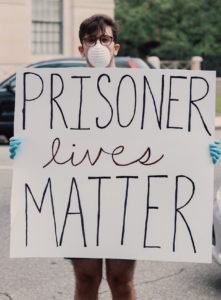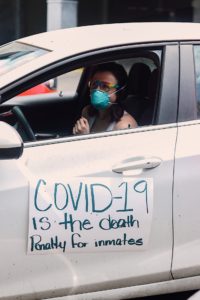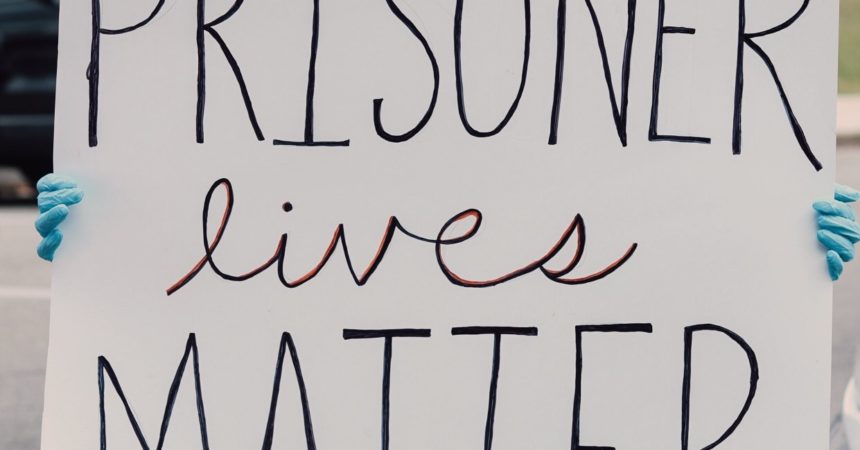Groups call for state attorney to halt incarceration during COVID-19 pandemic
Jonathon Williams’ case is one that exemplifies why 10 organizations have turned to state attorney Jack Campbell to release inmates with minor charges in an attempt to stem the spread of coronavirus in jail.
Williams has been jailed for six months on a violation of probation charge, according to Marie Rattigan, a field organizer for Dream Defenders. There are hundreds of similar cases, she said.
“He is married and has eight children,” Rattigan said. “His wife lost her job and the bills are piling up.”
The Dream Defenders, a civil rights organization that was formed in protest of the state’s stand your ground law in 2013, following the trial of George Zimmerman for the shooting of Trayvon Martin, is taking the lead in the call on Campbell.
The nine other organizations that signed a March 26 letter to Campbell include the ACLU of Florida and the New Florida Majority. Some members of the organizations that signed the letter were among protesters who staged an automobile rally down town last week, using a route around the Department of Corrections building and governor’s mansion.

Some protestors lined the street with signs to make their case last week near the Capitol.
Photo by Saskiya Fagan
The issue of incarceration during the pandemic is becoming a statewide concern for jails and prisons.
Just this past Sunday, four inmates have died of COVID-19, according to The Geo Group Inc., which operates Blackwater River Correctional Facility in Santa Rosa County. Other cases of coronavirus infections have been reported at jails and prisons around the state.
As of last Sunday’s update, 361 Florida prisoners had been tested for the virus. Corrections officials also said that 22 percent of test results were still pending. The News Service of Florida also reported that COVID-19 was detected in 56 corrections facilities and four probation offices throughout the state.
The lengthy letter, which lists the organization’s demands, outlined “the urgency of this moment and the unprecedented response necessary,” Rattigan said.
In part, the groups called for a moratorium on new bookings and carceral sentences, a process to immediately release all people being held before their trial, releasing people with less than 60 days left on their sentence, loosening restrictions on house arrest and GPS monitoring.
Campbell acknowledged receiving the letter, but said he could not let out every person in jailed in the Leon County Detention Center.
“The only way I can accomplish that is to drop every charge that we are currently prosecuting, which I’m not going to do,” Campbell said. “We’ve got people awaiting trials on murders and are very dangerous.”
Having people in jail is also a public safety issue when they face the threat of contracting the virus that causes COVID-19, a repertory disease, said Saskiya Fagan, the Dreamers’ transformative justice chair in Tallahassee.

Protestors formed a caravan through sections of downtown last week, calling for inmates with
low-level charges to be released from jail.
Photo by Saskiya Fagan
“There is another way to navigate our world,” she said. “If you have this label (of being incarcerated) you are no longer eligible to buy a house or if you have this label it is hard for you to have a career.
“That is not how we should be navigating our world. We want public safety but that (incarceration) is not how we get it.”
However, Campbell said there has been some release to help stop the spread of coronavirus in the jail. For example, he said there were 1,085 inmates in the Leon County Detention Center two weeks ago. That number has since been reduced to 882, which is an 18.7 percent reduction in the population.
He mentioned at least one case to underscore his hesitation to release inmates, pointing to the re-arrest of a female. Within 24 hours of being released, she was involved in a kidnapping and a high-speed chase, he said.
Meanwhile, precautions are being taken in an attempt to stop the spread of the virus in the jail, said Shade McMillian, public information officer for Leon County Sheriff’s Office. Every person who is booked is quarantine for 14 days, he said.
Corrections personnel are also using gloves and mask, he said.
“We believe that all of the people who are in Leon County jail and every other jail are there because they committed crimes and they either need to be punished for their crimes or the community could only be safe with them incarcerated,” Campbell said. “That’s the purpose of the jail; to keep everybody else safe and to punish people.”









